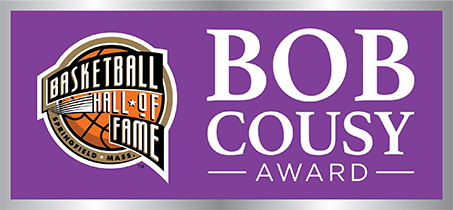
2025
Top 5 Finalists
| Player Name | School | |
|---|---|---|
 |
Mark Sears | Alabama |
 |
Walter Clayton Jr. | Florida |
 |
Kam Jones | Marquette |
 |
Braden Smith | Purdue |
 |
Zakai Zeigler | Tennessee |
Cousy's Career Highlights
College- The College of the Holy Cross (1946-50)
- The Sporting News First Team All-America (1950)
- The Sporting News Second Team All-America (1949)
- NCAA championship (1947)
- Two-time All-Conference and All-New England (1949, 1950)
- Team MVP and leading scorer (1949, 1950)
Pro
- NBA Boston Celtics (1950-63)
- NBA Cincinnati Royals (1969-70)
- Drafted in 1950 by the Tri-Cities Blackhawks, immediately traded to the Chicago Stags, then drawn by the Boston Celtics in a dispersal draft of the Stags franchise
- NBA MVP (1957)
- All-NBA First Team (1952-61)
- All-NBA Second Team (1962-63)
- NBA All-Star Game MVP (1954, 1957)
- Thirteen-time NBA All-Star (1951-63)
- NBA championships with the Boston Celtics (1957, 1959-63)
- Led the NBA in assists from 1953-60, including a career high 9.5 per game in 1960
- Holds NBA record for most assists in one half (19, Feb. 27, 1959 vs. Minneapolis)
- NBA 25th Anniversary All-Time Team (1970)
- NBA 35th Anniversary All-Time Team (1980)
- NBA 50th Anniversary All-Time Team (1996)
Past Winners
| Year | Player Name | School |
|---|---|---|
| 2024 | Tristen Newton | UConn |
| 2023 | Markquis Nowell | Kansas State |
| 2022 | Collin Gillespie | Villanova |
| 2022 | Collin Gillespie | Villanova |
| 2021 | Ayo Dosunmu | University of Illinois |
| 2020 | Payton Pritchard | University of Oregon |
| 2019 | Ja Morant | Murray State University |
| 2018 | Jalen Brunson | Villanova University |
| 2017 | Frank Mason III | University of Kansas |
| 2016 | Tyler Ulis | University of Kentucky |
| 2015 | Delon Wright | University of Utah |
| 2014 | Shabazz Napier | University of Connecticut |
| 2013 | Trey Burke | University of Michigan |
| 2012 | Kendall Marshall | University of North Carolina |
| 2011 | Kemba Walker | University of Connecticut |
| 2010 | Greivis Vasquez | University of Maryland |
| 2009 | Ty Lawson | University of North Carolina |
| 2008 | DJ Augustin | University of Texas |
| 2007 | Acie Law IV | Texas A&M University |
| 2006 | Dee Brown | University of Illinois |
| 2005 | Raymond Felton | University of North Carolina |
| 2004 | Jameer Nelson | St. Joseph's University |

